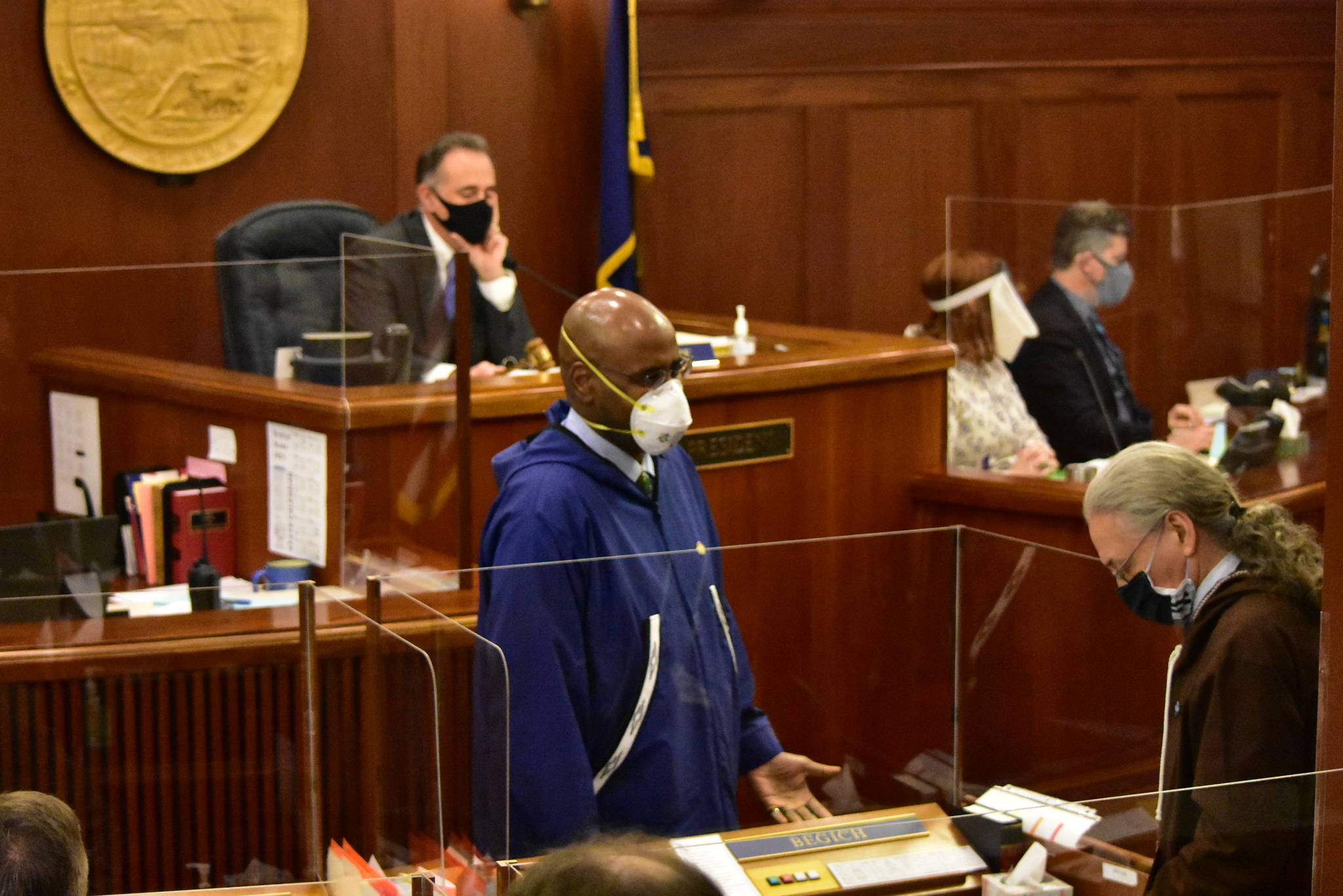Lawmakers didn’t organize fast enough to extend the state’s disaster declaration by law and Gov. Mike Dunleavy is refusing to issue another 30-day order, leaving health officials worried about their ability to respond to the pandemic.
The state’s emergency declaration over the COVID-19 pandemic is expected to expire at midnight Monday after a prolonged failure by members of the House of Representatives to organize and a refusal by Dunleavy to extend the declaration now that the Legislature is in session. A declaration has been in place since March 11, 2020, and the state’s health experts say it’s what’s allowed the state to respond effectively to the pandemic.
Dunleavy has already extended the declaration twice but a governor can only extend the order by 30 days. Some lawmakers, even ones who support extending the order, have questioned the legality of those actions.
“In the absence of a declaration, my administration is fully prepared to manage the rollout and distribution of the vaccine to ensure anyone that wants a vaccination will be able to get one,” Dunleavy said Friday in a statement. “We will also continue to respond to COVID-19 as we begin the process of getting back to normal as soon as possible by focusing on the economy and assisting Alaskans in staying healthy. As we move forward, we will notify Alaska and stakeholders of our plans.”
After a lengthy debate on the Senate floor Friday, lawmakers in that body voted to support a resolution urging the governor to issue another 30-day disaster declaration. The governor said in a Feb. 10, news conference now that the Legislature is back in session, declaring an emergency is up to lawmakers.
But the deadlock in the House means that even if the representatives had organized committees on Friday, there was still not enough time to pass a bill containing a declaration before the expiration on Feb. 15.
[Deadlock ends, state House selects a speaker]
“There is simply not enough time for (the House) to act. We don’t have time to pass a bill, and we are not in a strong position legally,” said Sen. Gary Stevens, R-Kodiak, during Friday’s floor session. “We can offer the governor our help in trying times. This may not be the preferred action, but this is the best we can do.”
Sen. Jesse Kiehl, D-Juneau, said the governor had the chance to call the Legislature back to special session to extend the emergency and didn’t. He added that while the resolution was well-intentioned, it was asking Dunleavy to break the law. The leadership of the previous Legislature sent a letter to the governor in November urging him to call a special session, citing the lack of votes in the body itself.
“The Legislature has given the governor tremendous powers (during the pandemic),” Kiehl said. “To ask a governor to use them again in a way that violates the law, does harm to the institution of the Legislature.”
The Senate ultimately passed the resolution, with two amendments submitted by Sen. Lora Reinbold, R-Eagle River. Reinbold’s amendments weren’t directly about the disaster declaration but had to do with the COVID-19 vaccine.
One required medical providers to provide informed consent before receiving the injection, and a right to decline the injection. Both passed without objection but Kiehl pointed out that both were already covered by Alaska law.
During the news conference, Dunleavy said there was a lot of misunderstanding around the emergency declarations. Many cities such as Anchorage and Juneau were still able to implement their own health orders such as lockdowns and mandates regardless of what the state does.
The rumors that a declaration would allow the governor to declare martial law or that vaccinations would be forced were completely false. Dunleavy cautioned against believing in misinformation circulating on social media and urged Alaskans to, “do your research.”
Senators mostly voted along party lines with Republicans voting in favor of the resolution. Senate Minority Leader Tom Begich, D-Anchorage, raised several issues with the resolution during the debate, switched his vote to a yea at the last second to bring the final vote to 11-6.
Sens. Lyman Hoffman, D-Bethel; Natasha Von Imhof, R-Anchorage and Mike Shower, R-Wasilla, were excused.
Only 19 House members were present for the Feb. 12, floor session and lawmakers who were present scheduled a meeting for Monday and adjourned within three minutes of beginning. House rules say committee assignments must be given within a day of a Speaker being chosen, but Stutes told reporters after the session there was no quorum to do business.
Stutes said a majority had formed in the House but declined to say which members had officially joined. Rep. Kelly Merrick, R-Eagle River, cast the deciding vote that elected Stutes, but said in a statement shortly after the Thursday vote that she was not joining the majority.
State health experts have cautioned that several of the waivers that have allowed state agencies to respond to the virus will go away when the declaration does. Typical government procurement processes for things like supplies can take several weeks, Department of Health and Social Services Commissioner Adam Crum has told lawmakers, and telehealth waivers have been essential for providing services in rural areas. Crum also told lawmakers the state could lose up to $8 million a month in food stamp benefits.
Many municipalities in the state can declare their own disaster declarations but city and state health organizations have been working together since the beginning of the pandemic.
The City and Borough of Juneau Assembly voted Thursday to keep in place the local emergency orders and set up new travel regulations for the airport meant to mirror the state’s lapsing requirements.
The traveling public will see no change in travel requirements due to having the local ordinance in place, the city said Friday in a news release.
• Contact reporter Peter Segall at psegall@juneauempire.com. Follow him on Twitter at @SegallJnuEmpire.

